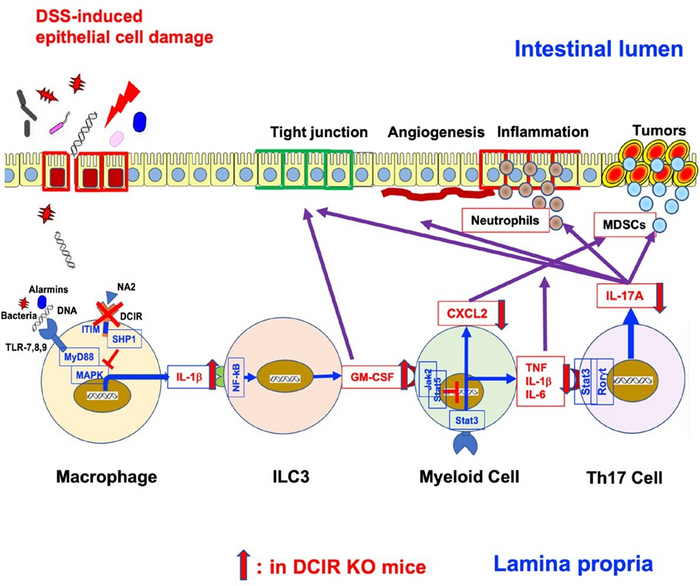Inflammatory bowel disease (IBD) is an umbrella term for two diseases, Crohn’s disease and ulcerative colitis, that are characterized by the prolonged inflammation of the gastrointestinal tract. This condition often leads to the development of colorectal tumors. Understanding the pathogenesis of IBD is, therefore, crucial to mitigate the incidence of colonic tumors.

Credit: Yoichiro Iwakura from Tokyo University of Science, Japan
Inflammatory bowel disease (IBD) is an umbrella term for two diseases, Crohn’s disease and ulcerative colitis, that are characterized by the prolonged inflammation of the gastrointestinal tract. This condition often leads to the development of colorectal tumors. Understanding the pathogenesis of IBD is, therefore, crucial to mitigate the incidence of colonic tumors.
It turns out that innate immune receptors, particularly those expressed in the gut, such as C-type lectin receptors (CLRs), are responsible for the development of IBD. However, CLRs also play a vital role in the regulation of gut microbiota and defense against pathogens. As a result, a balance needs to be struck to maintain intestinal homeostasis.
Dendritic cell immunoreceptor (DCIR) is one such CLR that is responsible for maintaining homeostasis of the immune and skeletal systems. Previous studies have suggested that DCIR negatively regulates both innate and acquired immune responses. Blocking DCIR could, therefore, potentially boost immunity against colon tumor. However, its role in intestinal immunity has remained unclear.
Against this backdrop, a research group led by Professor Yoichiro Iwakura of Tokyo University of Science (TUS) in Japan has now shed light on this issue. In their study, to be published online on 02 August 2022 in the international journal Cell Reports, the group studied the development of colitis and colon tumor in mice models deficient in DCIR.
To this end, the group fed the mice with drinking water containing dextran sodium sulfate (DSS), a synthetic sulfated polysaccharide, and azoxymethane (AOM), a neurotoxic chemical, to induce colon tumors similar to that observed in humans with IBD.
To their surprise, they found that the mice lacking DCIR showed reduced colitis severity and AOM-DSS–induced colorectal tumor growth. Moreover, compared to the wild-type mice (control), the DCIR-deficient mice showed lower body weight loss as well as reduced proinflammatory cell infiltration in the colon.
What do these observations imply? Prof. Iwakura explains, “Our findings point to the fact that intestinal carcinogenesis and inflammation are facilitated by DCIR signalling, which points to the possibility that blocking DCIR might prevent ulcerative colitis and colon cancer.”
Corroborating this possibility, the study further revealed that the use of an antibody called “anti-NA2” against asialo-biantennary-N-glycans (NA2), a ligand (binding molecule) to DCIR, reduced DSS colitis symptoms and prevented colorectal tumor growth.
The researchers are excited by these findings. Speaking about the practical applications of their study, Prof. Iwakura says, “Our results suggest that therapeutics targeting DCIR and its ligands could be used to effectively treat autoimmune diseases, IBD, and cancer, which have been traditionally difficult to treat.”
Sure enough, this study could open doors to novel therapeutic strategies for treating colorectal tumors, improving not only the lives of patients with IBD but also our understanding of the pathogenesis of human diseases.
***
Reference
DOI: https://doi.org/10.1016/j.celrep.2022.111158
About The Tokyo University of Science
Tokyo University of Science (TUS) is a well-known and respected university, and the largest science-specialized private research university in Japan, with four campuses in central Tokyo and its suburbs and in Hokkaido. Established in 1881, the university has continually contributed to Japan’s development in science through inculcating the love for science in researchers, technicians, and educators.
With a mission of “Creating science and technology for the harmonious development of nature, human beings, and society”, TUS has undertaken a wide range of research from basic to applied science. TUS has embraced a multidisciplinary approach to research and undertaken intensive study in some of today’s most vital fields. TUS is a meritocracy where the best in science is recognized and nurtured. It is the only private university in Japan that has produced a Nobel Prize winner and the only private university in Asia to produce Nobel Prize winners within the natural sciences field.
Website: https://www.tus.ac.jp/en/mediarelations/
About Professor Yoichiro Iwakura from Tokyo University of Science
Professor Yoichiro Iwakura has been the director of the Center for Animal Disease Models at the Tokyo University of Science (TUS) since 2013, and has published numerous papers since his graduation from Kyoto University in 1970. He started researching interferon proteins at the university’s Institute for Virus Research before moving to the Sloan-Kettering Cancer Institute in the United States to analyze the developmental mechanism of early mouse embryos. In 1985, he moved to the University of Tokyo where he generated more than 100 lines of gene-modified mice as the director of the Center for Experimental Medicine to analyze the pathogenesis of infectious and autoimmune diseases.
He retired from the University of Tokyo and became an Emeritus Professor in 2012. He then moved to TUS. He has been a visiting professor for many universities, including Dalian Medical University in China and Chiba University in Japan. His work involves the development and analysis of animal disease models and research on autoimmune diseases and infectious diseases. He won the Hideyo Noguchi Memorial Award for Medical Science in 2015 and was selected as a highly cited researcher (Thomson Reuters and Clarivate Analytics) for six consecutive years from 2014.
Funding information
This work was funded by Grants-in-Aid from the Ministry of Education, Culture, Sports, Science, and Technology of Japan (18H02671, 20H04954, 21H02394).
Journal
Cell Reports
DOI
10.1016/j.celrep.2022.111158
Method of Research
Experimental study
Subject of Research
Animals
Article Title
Blocking DCIR mitigates colitis and prevents colorectal tumors by enhancing the GM-CSF-STAT5 pathway
Article Publication Date
2-Aug-2022
COI Statement
The authors declare no competing interests




